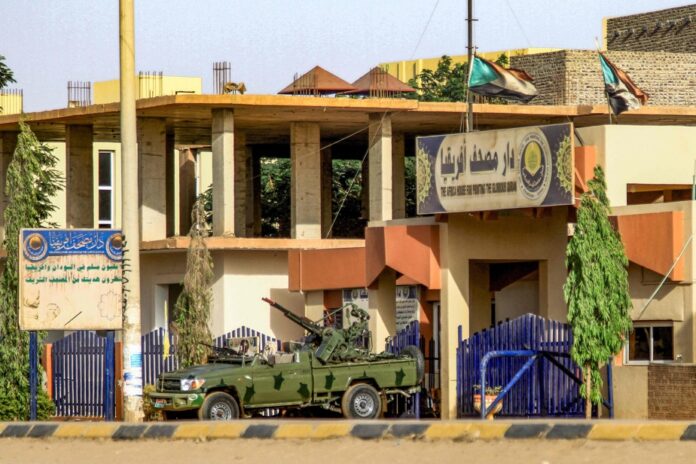(Khartoum) More than 185 people have been killed in Sudan where the struggle for power between the two generals in charge since the 2021 putsch has gained in intensity.
In the sky of Khartoum, the planes of the army of General Abdel Fattah al-Burhane, de facto leader of the country since the putsch of 2021, try to overcome the intense fire from the armored vehicles of the paramilitaries of the Rapid Support Forces (RSF ) of General Mohamed Hamdane Daglo, known as “Hemedti”, his second in command for the coup d’etat who has become his sworn enemy since Saturday.
At least two hospitals in the capital have been evacuated “as rockets and bullets riddled their walls”, said doctors who say they have no more blood bags or equipment to treat the wounded.
In addition to the crossfire, which killed three employees of the World Food Program (WFP) in Darfur (West), humanitarian workers must now also deal with looting, reports Save the children. Several NGOs and UN agencies have already announced that they will suspend their activities, a blow in a country where hunger affects more than one in three inhabitants.
Médecins sans Frontières (MSF) says it received 136 wounded on Monday in its last functional hospital in North Darfur. “The majority are civilians who were shot, including many children,” the NGO reports. “Eleven died” on Saturday and Sunday due to lack of equipment and personnel.
In Khartoum, since the outbreak of fighting on Saturday, residents have been barricading themselves in their homes. Above them, columns of thick black smoke rise, the smell of gunpowder pricks the nostrils and everyone wonders when the electricity and running water will return.
With each new air strike or artillery fire, parents and children jump, say families who have never seen such violence in the capital of a country which launched four years ago in a transition that was intended to be democratic.
Today, everyone is watching from their windows as armored vehicles or militiamen pass by in civilian vehicles from which they have removed the number plates. Hoping that no stray bullets or shrapnel hit their building.
The few grocery stores open have warned that they will last only a day or two if no trucks come in to supply the city.
More than 185 people were killed, according to the UN, and at least 1,800 injured. The belligerents have never communicated on their losses.
The UN calls on the two generals to “immediately cease hostilities” as they could be “devastating for the country and the entire region”. But the UN envoy to Sudan, Volker Perthes, said he was not optimistic about a quick return to dialogue as “it is difficult to assess in which direction the balance is changing”.
The conflict had been latent for weeks between General Burhane and General Mohamed Hamdane Daglo, whose former militiamen from the war in the Darfur region had become official army auxiliaries in recent years.
On Monday, diplomatic contacts appeared to intensify.
At the end of the day, Egypt, a large influential neighbor, announced that it had discussed the situation with Saudi Arabia, South Sudan and Djibouti, three other important players in Sudan, as well as with Paris. Qatar for its part spoke with the President of the Commission of the African Union (AU), Moussa Faki Mahamat, supposed to go as soon as possible to Sudan, above which no plane flies anymore.
In the midst of a media war, the belligerents continued to rail against each other: “Burhane is bombing civilians from the air, we are prosecuting him and will bring him to justice”, launched General Daglo, in English, on Twitter. Opposite, the army assured on Facebook “to get closer to the hour of final victory”.
It was still impossible on Monday to know which force controls what. The FSR announced that they had taken the airport and entered the presidential palace, which the army denied.
The army claims to hold the headquarters of its staff, one of the main power complexes in Khartoum.
As for state television, after two days of fighting in its vicinity, it now broadcasts images and press releases from the army, which claims to have regained ground in many places.
“It is the first time in the history of Sudan since independence [in 1956] that there is such a level of violence in the center, in Khartoum”, assures AFP Kholood Khair, who founded the Confluence Advisory research center in Khartoum.
Khartoum “has always been the safest place in Sudan, during the deadly rebel wars” launched in Darfur and elsewhere in the 2000s, she said.
But since Saturday, doctors have been reporting power cuts in operating rooms, telling of patients, sometimes children, and their loved ones “having no more food or drink.”
“Today, the fighting is taking place all over the city, the RSF are established everywhere and especially in densely populated areas because the belligerents believed that the possibility of a high civilian toll would deter the other side: now we know that their power struggle at all costs won out,” Ms. Khair summed up.


















